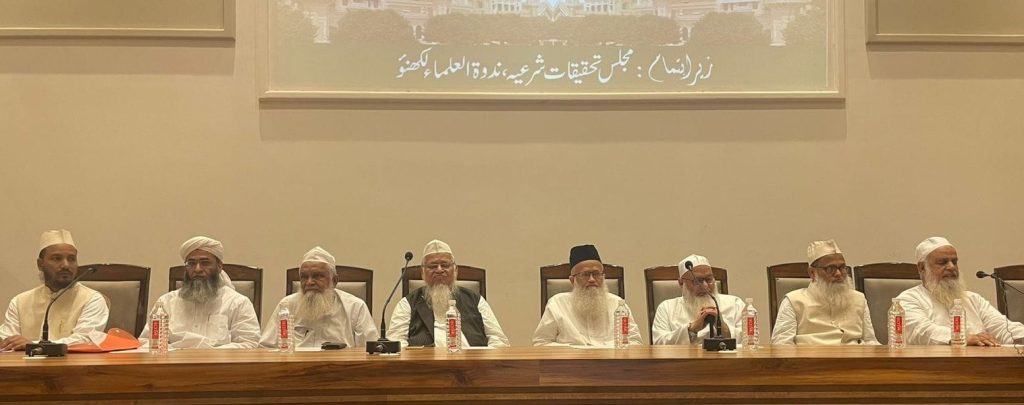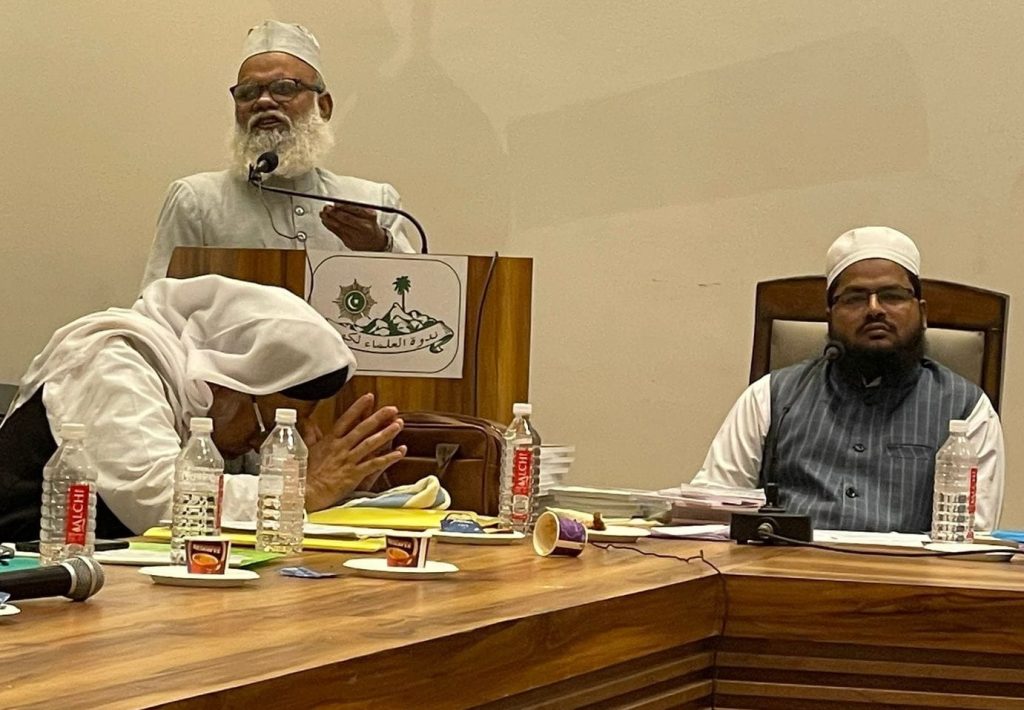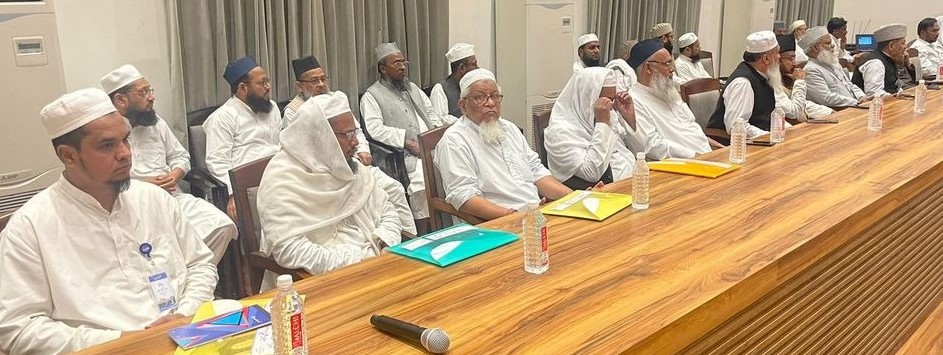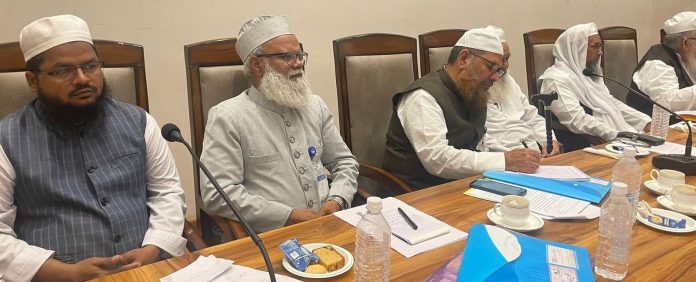– Anwarulhaq Baig
New Delhi, October 25, 2023: Prominent Muslim scholars and Islamic jurists from across the country have given significant recommendations related to offering Namaz at public places in India, allowing women’s entry into mosques and determining the current minimum threshold value for Zakāt. They were addressing a seminar at the world-famous Lucknow-based Islamic seminary, Nadwatul Ulama.
The fifth three-day Islamic jurisprudence seminar was organized recently by Nadwatul Ulama’s Sharia Academy for Research and Studies from October 20-22, to thoroughly examine the Shari’a rulings concerning Salah at public places, given the current challenging situation in the country, including the legal aspects, the entry of women into mosques, and the determination of the current value of the minimum threshold or Nisab for Zakat on gold and silver.
 The Sharia Academy was established in 1963 by world-renowned Islamic scholar and former Nadwatul Ulama Moulana Syed Abul Hasan Ali Hasani Nadwi with the aim of determining and carrying out research work to know the Islamic instructions regarding emerging problems in the contemporary age. The academy comprises noted Islamic scholars and jurisprudence experts of the country belonging to different schools of thought.
The Sharia Academy was established in 1963 by world-renowned Islamic scholar and former Nadwatul Ulama Moulana Syed Abul Hasan Ali Hasani Nadwi with the aim of determining and carrying out research work to know the Islamic instructions regarding emerging problems in the contemporary age. The academy comprises noted Islamic scholars and jurisprudence experts of the country belonging to different schools of thought.
Similar sharia academies and institutes are working across the country, such as Jamiat-e-Ulama Hind’s Jurisprudence Research Department (إدارة المباحث الفقهية), the Islamic Fiqh Academy, which was established in 1988 under the guidance of Qazi Mujahidul Islam Qasmi, former president of All India Muslim Personal Law Board (AIMPLB), and Shar’ee Council of India, founded by Mufti Akhtar Raza Khan Qadri, a well-known Barelvi scholar and the great-grandson of Imam Ahmed Raza Khan Barelvi.

Sharing his opinions on the topics as a special guest, the noted scholar and the secretary of Jamaat-e-Islami Hind (JIH), Dr. Mohammad Razi-ul-Islam Nadwi, who is also associated with Nadwatul Ulama, highlighted the Sharia Academy’s primary objective of providing more practical and easier solutions to contemporary issues while adhering to the established principles of Islamic jurisprudence.
Talking with the Radiance, Dr. Nadwi informed that during his speech at the seminar, he urged Islamic jurists and muftis to pay greater attention on this academy’s important objective of providing easier solutions to common people of their emerging problems. While urging jurists to choose the easier option for the common men if a problem has multiple solutions or aspects, he maintained that it is incorrect to call it self-indulgence. Due to the widespread irreligiosity, he pointed out that following Islamic teaching has now become difficult. He added that in such a challenging situation, if ordinary Muslims want to practice and solve their problems according to Islamic teachings, the instructions of Sharia should not be presented in a way that makes it difficult for people to follow them.
Dr. Nadwi emphasized the importance of respecting differences of opinion among scholars from different Islamic schools of thought. However, he added that this does not mean that their views should be blindly accepted or that they should not be analyzed or criticized if they have flaws or shortcomings.
Rejecting the notion that it is incorrect to give new opinions in cases where previous fatwas exist, Dr. Nadwi clarified that fatwas are specific to the opinions of individual scholars, and the opinions of different muftis may differ. Praising the dynamic and adaptable nature of Islamic jurisprudence in the face of changing circumstances, Dr. Nadwi asked scholars to consider relevance in the current time and the well-being of the community when issuing fatwas.
 Islamic prayer at public places
Islamic prayer at public places
Issuing a statement based on the recommendations of distinguished Islamic scholars who participated in the seminar, the Sharia Academy for Research and Studies says that during travel, timely prayer is essential, even at public places such as parks, railway stations, airports, trains, and buses. However, it recommends that Muslims avoid inconveniencing others when praying at public places and that they can delay the prayer if it would cause harm, discomfort, or it is not feasible to pray properly.
Expressing concerns about recent incidents of violence and harassment against Muslims during public prayers, the statement urged the government not to allow anyone to obstruct those who want to pray peacefully in public places.
Observing that Muslims have maintained good relations with their fellow citizens in India, where they have lived for centuries, and that it is common for Muslims to pray at public places, the Sharia Academy calls on non-Muslims to uphold the age-old tradition of mutual respect, amity and understanding and oppose those who undermine it.
Allowing women’s entry into mosques
Stating that Islamic traditions permit women to visit mosques with certain conditions, though it is considered more virtuous for them to pray at home, the Sharia Academy allows women to pray in a mosque under certain conditions, such as when they are away from home due to some necessity and for fear of missing prayer time, and if there is a mosque nearby. The statement reads, “In the absence of a suitable place for women’s preaching and reforming programmes, there is a scope for conducting events in mosques. It is correct to allocate a corner in mosques where there is space for women to perform their obligatory prayers if they are out of the home due to necessity.”
In February of this year, the AIMPLB informed the Supreme Court that there is no prohibition in Islam on women offering prayer in segregated spaces within mosques. The AIMPLB submitted this affidavit in the apex court in response to a petition filed by Pune-based advocate Farha Anwar Hussain Shaikh, seeking to declare any prohibition on women’s entry into mosques illegal and a violation of gender justice laws.
Gold and Silver Zakat Threshold
The Islamic Sharia prescribes a certain minimum threshold, called Nisab, for obligatory charity, Zakat. Nisab is the minimum amount of wealth a Muslim must have before becoming liable to pay Zakat every lunar year. According to the statement, the Nisab for gold is around 87.5 grams, and the Nisab for silver is around 612 grams. A Muslim whose wealth exceeds these amounts must pay 2.5% of the value of their wealth in zakat.
However, there is a difference of opinion among Islamic jurists regarding the value to use to calculate the Nisab threshold for trade goods and cash, whether gold or silver. While the majority of jurists use the value of silver to calculate the Nisab threshold and determine Zakat eligibility, others use the value of gold.
The Sharia Academy has acknowledged that a large number of seminar participants supported the majority of jurists’ position, but a significant number of them regarded 87.5 grams of gold as the minimum threshold for Zakat.
The statement explains that if a person has less than the Nisab of both gold and silver, it is permissible to combine the two by weight. If the combined amount reaches the Nisab, Zakat is obligatory, otherwise it isn’t.
The statement further says that if a person has less than the Nisab of gold and silver, and also has trade goods or cash, then the question of whether Zakat is obligatory on the combined value will be determined using the Nisab of silver, which is 612 grams.
The organizers of the seminar vowed to continue providing a platform for deep exploration of Islamic jurisprudence, bringing together scholars from diverse backgrounds to jointly address the challenges of the present time in the light of Islamic principles. The seminar also emphasized the importance of collective ijtihad and the continued commitment to finding practical solutions within the framework of Islamic jurisprudence.
Maulana Bilal Abdul Hai Hasani, head of the Nadwatul Ulama, presided over the inaugural session in which several distinguished personalities including Maulana Rahmatullah Nadwi, Maulana Kamal Akhtar Nadwi, and Maulana Mohammad Zakariya Sambhali, Maulana Atiq Ahmad Bastawi, the secretary of the Sharia Academy delivered their speeches.
In his key-note speech, Maulana Bilal Hasani Nadwi emphasized the importance of involving scholars from various schools of thought and seeking guidance from renowned Arab jurists.
According to Dr. Raziul Islam Nadwi, the inaugural session also featured the release of several books related to the topics while each topic was presented and analyzed by one of the attendees during the seminar.
The last session of the seminar was presided over by Dr. Moulana Saeedur Rahman Azmi Nadwi, the principal of the Islamic seminary.
The seminar hosted over one hundred delegates, including Mufti Abdur Razzaq Qasmi, Darul Uloom Deoband; Maulana Ubaidullah Asadi, Maulana Rahmatullah Kashmiri, Mufti Habibullah Qasmi, Mufti Anwar Ali Azmi, Mufti Nazeer Ahmed Kashmir, Mufti Amanat Ali Qasmi, Mufti Tanzeem Alam, Qasmi, Dr. Faheem Akhtar Nadvi, Dr. Kaleemullah Umari, and Maulana Munnawar Sultan Nadwi. Other teachers and students of the Islamic seminaries also participated in the seminar.




